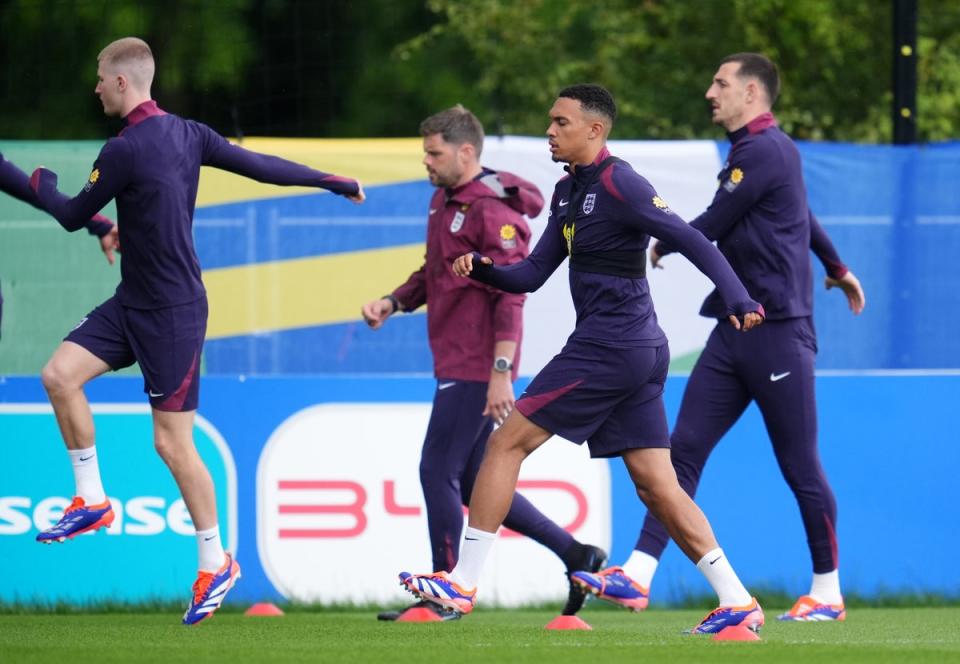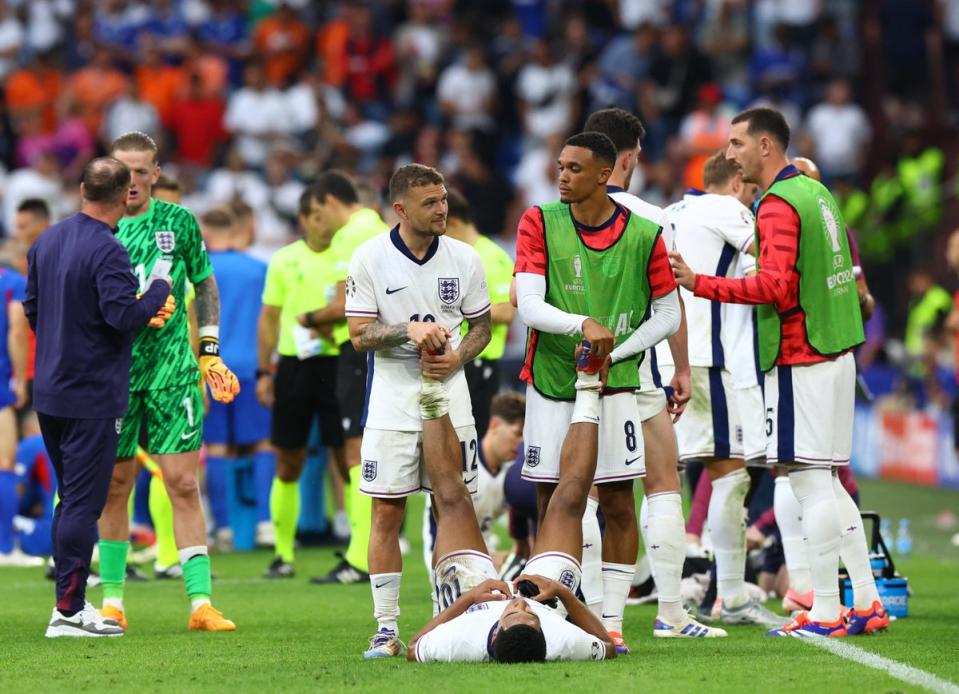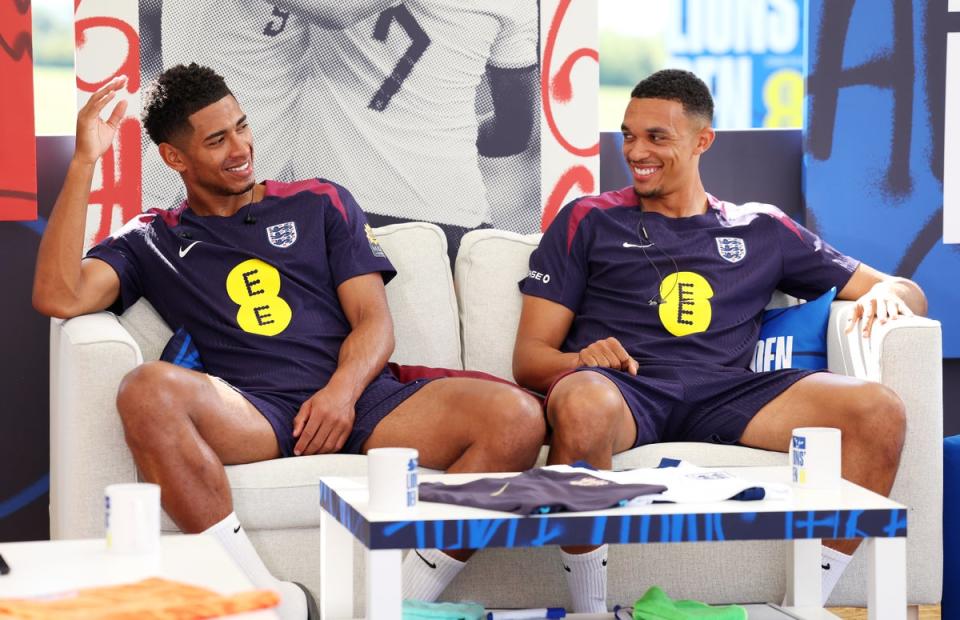Trent Alexander-Arnold can dispel Gareth Southgate myth with obvious England change
The Trent Alexander-Arnold Experiment is dead. Time for another Trent Alexander-Arnold Experiment. Liverpool’s vice-captain seems a misunderstood, underused talent at international level. His time in midfield spanned 123 minutes against Serbia and Denmark and was of sufficient importance, such a scientific voyage of discovery, that it assumed a status of its own. It was an ‘Experiment’.
That it has been deemed a failure was apparent when Gareth Southgate worked his way through a series of partners for Declan Rice against Slovakia – Kobbie Mainoo for craft, Conor Gallagher for graft, Jude Bellingham for overhead kicks – and no scenario called for Alexander-Arnold.
Not as a midfielder anyway. But there felt a pressing need for Alexander-Arnold in his original incarnation, as the right-back revolutionary, the creator supreme, a player with a capacity to make the extraordinary happen. There appeared to be a shift in thought when Gary Neville, England’s most capped right-back until a couple of weeks ago, said it was “illegal” that Alexander-Arnold wasn’t playing. “He's the best footballer at right-back we've ever seen in this country,” said Neville, a more prosaic talent recognising an extraordinary one.
Had Slovakia won, as they deserved to, then it may have ushered in an era when Alexander-Arnold went from third- or fourth-choice to automatic. Southgate’s reign would surely have ended, probably of his own volition. The curtain could have come down on the international careers of the two players who have been Alexander-Arnold’s nemeses.
Kyle Walker and Kieran Trippier have been rivals and a double act; sometimes starter and back-up, sometimes right-back and left-back, sometimes right-sided centre-back and right wing-back. They have been two of Southgate’s most trusted allies. Born within four months of each other in 1990, they have a combined 139 caps.
For each, Slovakia might have been the last. Trippier has admitted that, realistically, he may not make the 2026 World Cup. Walker has twice contemplated international retirement before but recently talked about carrying on, inspired by Pepe and Luka Modric. For once, however, he started to look his age against Slovakia.
The master of high-speed duels with Kylian Mbappe and Vinicius Junior, was tormented by the less heralded Lukas Haraslin, the roadrunner suddenly trying to wade through quicksand. He looked uncertain of his positioning and of what to do when passes were slid past him. He almost supplied the knockout blow, rolling a free kick straight to David Strelec who, with Jordan Pickford out of his box, nearly scored from 50 yards. It was one of the worst of his 87 appearances for England; it was an illustration of all the old certainties of Southgate’s England being destroyed.

When the manager has kept 10 of the same starters for each game – the other coming from whichever midfielder he prefers – and the dynamic of the team is not working, there is a mandate for change. In the group stages, England could at least console themselves with their defensive record, showing a lone goal conceded and the lowest expected goals against. Yet Slovakia had an xG of 2.09.
Walker’s defensive excellence has been his trump card; there has never been a pretence he can cross the ball like Alexander-Arnold. It may save him for the quarter-final. Switzerland are particularly strong on their left flank: clever rotations on that side enabled them to unlock Italy. Walker could still seem the safety blanket for Southgate.

Yet the sterility further forwards reflects on the full-backs. England’s lack of a left flank has been a theme in the extended absence of Luke Shaw. They used four players at left-back against Slovakia, none actually a left-back. Trippier at least got forward to provide the centre for Phil Foden’s disallowed goal.
But if Walker’s remit is primarily defensive, he has offered no semblance of creativity: his four games have brought no crosses that found a teammate in the penalty area, no passes to find any in the box, one key pass, to Trippier’s seven. Walker’s expected assists so far is 0.1.
He has nevertheless been involved in two goals - a cutback that took two deflections before Harry Kane scored against Denmark and a long throw Marc Guehi flicked on for Jude Bellingham versus Slovenia - but not with invention.

Unleashing Alexander-Arnold could at least add another dimension. Given that salvation for England eventually came by getting the ball into the box, putting their finest crosser on the pitch would afford that option. And if Southgate’s original plan to convert Alexander-Arnold to a midfielder stemmed in part from a belief that he could not displace Walker at right-back, that was when England had a functioning system and gameplan.
Now they don’t. And if Alexander-Arnold’s brief stint in midfield contributed to the problem, a return to right-back offers an alternative way of playing. But if, one way or another, Alexander-Arnold has spent six years waiting for Walker and Trippier to leave the stage, his time could be finally near.


